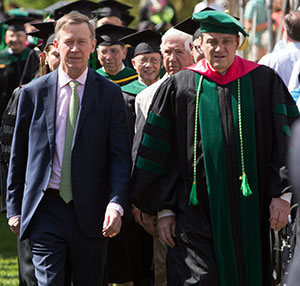Graduation 2017
 (May 26, 2017) Colorado Gov. John Hickenlooper told the University of Colorado’s 152 graduating medical students on Friday that they will need two important qualities as they pursue their careers: strength and empathy.
(May 26, 2017) Colorado Gov. John Hickenlooper told the University of Colorado’s 152 graduating medical students on Friday that they will need two important qualities as they pursue their careers: strength and empathy.And notably, successful physicians must depend on both qualities simultaneously during difficult times.
"Strength is not strength without empathy," said Hickenlooper, who was the invited guest speaker for the CU School of Medicine’s Hooding and Oath Ceremony held on the Boettcher Commons on the Anschutz Medical Campus. "By itself, strength can actually be a weakness."
"You have to tell grieving mothers and daughters, fathers and sons that their biggest, worst fears have come true. You tell them you have some bad news, and nothing can be done. And you'll be alone. You'll be the only person that can deliver that diagnosis. "
While diagnostic skills are fundamental to treat and heal, the ability to communicate with compassion is essential.
"As instruments of healing, your strength is how well you listen, validate, touch and soothe day in and day out. Your strength will at times be tested by bureaucracy because health care has become a business, and companies don't always see the human face you'll see, the suffering and the joy.
"Your challenge is to build this strength and use it in your lifelong pursuit."
Student Profiles
The divisive political atmosphere in the nation, especially around the subject of health care, will thrust the new physicians onto the front lines of the debate, the governor said. He assured them they will have allies in government who "want to create a world where more people have access to health care not less. We'll make sure that the crazy notion that everyone deserves some basic health care will someday seem less crazy."Despite the turmoil of the times, graduates are entering the profession when they can make significant improvements to the quality of health care, said CU School of Medicine Dean John J. Reilly, Jr., MD.
"People of my vintage have seen enormous changes in the field of medicine over the course of our careers," he said. "I think that is just a foreshadowing of what you are going to experience over the course of your careers. You will have tools available to you to keep people healthy and treat people when they are sick that we could only dream about.
"As Gov. Hickenlooper alluded to, we live in tumultuous times in health care. I hope you will finish the job that we have tried to start, which is to remake the health care system into something that makes sense for all patients and is a better system to work in and does not bankrupt the country."
The dean encouraged graduates to listen to patients and team members and learn to embrace uncertainty.
"You will learn more from colleagues and patients than you will from conferences and lectures. This listening to patients is a core skill and that will remain a constant in medicine no matter how much technology changes. ... The most outstanding physicians that I've met share characteristics of empathetic curiosity and humility and at the same time self-confidence. Don't let pride prevent you from admitting when you've made a mistake, admitting when you don't know the answer or keeping you from having an open mind when others have suggestions."
The speakers advised graduates not to let fear motivate their behavior.
"Never fear mistakes because fear already drives too many of our decisions," Hickenlooper said. "Remember them and they will add to the fabric and resilience of your life and career."
Class speaker Clayton Garthe quoted MacArthur Fellow Angela Duckworth, who studied successful people in many professions and wrote that the one common denominator for success is grit.
"All of us have failed at something. We're all going to fail again. But having grit is knowing that failure is an opportunity to learn. Having grit is knowing that failing doesn't mean that you are a failure."